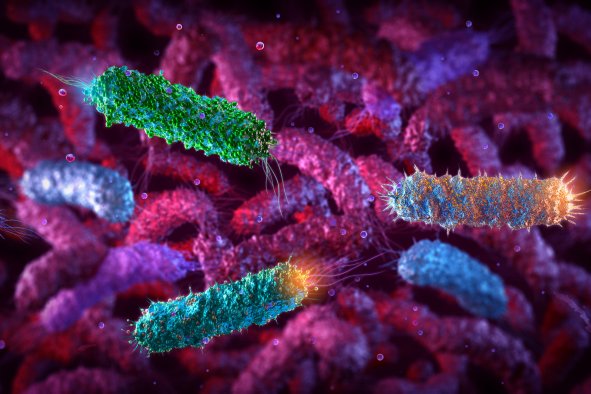Ozempic and licensed weight loss drugs may come with an overlooked risk, dietitians have warned.
Aside from the potential side effects and physical changes that one can expect from starting a new medication, appetite-suppressing medication comes with indirect problems, too.
Ozempic is an injectable prescription drug developed to manage blood sugar levels in patients with Type 2 diabetes. The drug has risen to recognition thanks to one desirable side effect: weight loss.
The drug is based on a molecule called semaglutide, which mimics the structure of a naturally occurring human hormone called glucagon-like peptide 1 (GLP-1). GLP-1 plays an important role in regulating appetite and blood sugar levels by activating specific receptors involved in these pathways.
Because of their similar structures, semaglutide can also activate these receptors, inducing feelings of fullness while delaying the emptying of our stomachs. In other words, semaglutide makes us less hungry and, therefore, less likely to overeat.
Semaglutide is also used in Ozempic's sister drug, Wegovy, which has been approved by the FDA for chronic weight management. While these drugs have helped millions of Americans move closer to their weight loss goals, it's easy to forget that food is not only a source of energy but also a source of nutrients.
"We don't have enough data specific to people on weight loss medications, but we do know they are at risk of not consuming enough water, calories, protein and fiber," Tara Schmidt, Lead dietitian for the Mayo Clinic Diet, Host of the Mayo Clinic On Nutrition podcast and co-author of The Mayo Clinic Diet: Weight-Loss Medications Edition, told Newsweek.
"This is a result of decreased nutritional intake, not necessarily the medication itself. We know that generally, Americans are under-consuming fiber, potassium, calcium, vitamin B6, and vitamin D. Females, especially during childbearing years, can [also] be at risk of low iron."
That's not to say that a lower-calorie diet will always result in nutrient deficiencies; it just has to be more carefully planned.
"A well-balanced diet can typically meet one's nutrient needs, even when lower in calories, but if someone's diet limits certain foods or food groups, it would be important to identify other food sources of that nutrient," Schmidt said.
"For example, calcium and vitamin D are most readily found in dairy products like milk, yogurt, and cheese. For those who wish to avoid dairy, tofu, soymilk, broccoli, some mushrooms, and fortified orange juice are other options but do not all contain both nutrients.
"[Another example is] Vitamin B12, which is naturally found in meat, fish, poultry, eggs and dairy. For those who follow a vegan diet, this can pose a challenge, so selecting fortified products like cereal, meat substitutes, and nutritional yeast can be helpful."
A spokesperson for Novo Nordisk, which produces Ozempic and Wegovy, told Newsweek that maintaining an active lifestyle and healthy, balanced diet is essential when using either of these medications.
"When a person reduces their caloric intake and lose weight, it becomes even more important to eat healthy and nutritious," Allison Schneider, Director of Media Relations at Novo Nordisk, told Newsweek. "We don't recommend a specific 'diet' with our medicines as that is part of the discussion patients should have with their prescribing health care professional. However, at the first sensation of feeling full, people should stop eating so they don't eat through any sensation of fullness or satiety."
Schneider added that Ozempic itself is not actually approved for chronic weight loss management. "Although Wegovy® and Ozempic® both contain semaglutide, they are different products with different indications, dosages, prescribing information, titration schedules, and delivery forms," Schneider said. "The products are not interchangeable and should not be used outside of their approved indications."
If you are worried about meeting nutritional guidelines while taking weight loss medication or on any restrictive diet, Schmidt recommends speaking to your health care provider.
"Registered dietitians and medical providers can also assess when dietary supplements are necessary, such as a multivitamin-multimineral, protein supplementation, or added fiber," she said.
When starting weight loss medication, Schmidt offered the following advice: "Food and beverage choices should provide adequate calories, protein, and hydration in a smaller volume of food, as overeating while on a GLP-1 may cause nausea or vomiting.
"Especially when starting or increasing the dose of a GLP-1 medication, eating a nutritionally adequate diet can be difficult. Soft, blended, or even liquid meals are often tolerated best when symptoms are at their worst.
"A few items to consider would include overnight oats, smoothies, Greek yogurt, soft fruit and protein shakes. These types of foods can provide protein, vitamins and minerals, fiber, and/or hydration."
Is there a health problem that's worrying you? Do you have a question about weight loss? Let us know via health@newsweek.com. We can ask experts for advice, and your story could be featured on Newsweek.
Disclaimer: The copyright of this article belongs to the original author. Reposting this article is solely for the purpose of information dissemination and does not constitute any investment advice. If there is any infringement, please contact us immediately. We will make corrections or deletions as necessary. Thank you.



